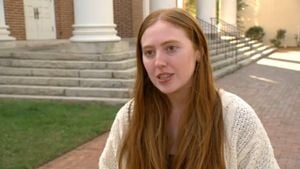Priyanka Gandhi Vadra officially marked her entry as a Member of Parliament on November 28, 2024, when she took the oath as the representative of Wayanad, Kerala. This moment is significant, as it not only highlights her shift from behind-the-scenes operations to active political engagement but also reinforces the historic legacy of the Nehru-Gandhi family within Indian politics.
Priyaka’s victory came as no surprise to political analysts. The Congress leader triumphed with over 410,000 votes, eclipsing the margin previously enjoyed by her brother, Rahul Gandhi, during his previous campaigns for the same seat. Her win was celebrated as it reaffirmed Wayanad’s stronghold status for the Congress party, reflecting the enduring influence of the Gandhi family on their constituency.
On the day of her swearing-in, Priyanka donned traditional Kerala attire, which was representative of both the culture of her new constituency and her respect for local traditions. The ceremony was not only attended by her family members, including her mother Sonia Gandhi and brother Rahul Gandhi, but also by various party leaders and supporters who echoed their pride through lively applause as she was announced as MP.
This inauguration marks the beginning of her significant role on the national stage, as she becomes the only woman MP from Kerala. The Congress party, particularly the United Democratic Front (UDF), now holds 18 seats, with the opposition parties, like the Bharatiya Janata Party (BJP) and the Communist Party of India (Marxist) presenting limited footholds with one seat each.
Yet, with the celebration of victory come substantial challenges. The electorate's sentiments have been shaped not only by personal connections but also by pressing issues, including healthcare inadequacies and human-wildlife conflict plaguing the Wayanad district. A notable concern was raised during her campaign: voters advocated the need for consistent presence and advocacy from their representative rather than seeing them as "tourist MPs,” with the previous representatives frequently criticized for their perceived lack of engagement.
An immediate priority for Priyanka is addressing the aftermath of the devastating landslide disasters which affected four villages, leaving over 400 people dead and many still missing. The region has yet to see the relief package announced by the central government, which only adds to the urgency of her role.
With her entry, the Nehru-Gandhi family continues to send ripples through the political sphere, recalling the rich history of their contributions to Indian governance. Her mother, Sonia, has filled significant roles over the years and is currently serving as Rajya Sabha MP from Rajasthan, alongside her brother Rahul, who has long represented Rae Bareli. Their collective experience and political heritage provide Priyanka with important support and direction as she navigates her legislative duties.
Priya's narrative reflects the legacy established by past family members, like her father Rajiv Gandhi, who pioneered technology and modernization efforts during his tenure, and her grandmother Indira Gandhi, India’s first female Prime Minister, who was known for her strong leadership. Priyanka aims to continue these efforts, expressing through her own words, "I am overwhelmed with gratitude for the trust you have placed in me. I look forward to being your voice in Parliament and working toward a brighter future for all." Her statement encapsulates the values of dedication to progress and welfare—principles long associated with the Nehru-Gandhi line.
Beyond addressing local constituency issues, she is expected to tackle broader national policies and legislations. With high expectations placed on her, Priyanka’s political engagements will likely be closely monitored, as citizens and party members alike anticipate how she will blend the rich traditions of her family's political lineage with her distinct vision for the future of Wayanad and beyond. Her upcoming visit to thank the voters is just one step as she gears up for what promises to be not only her first term but one filled with opportunities and challenges reflecting contemporary Indian politics.



